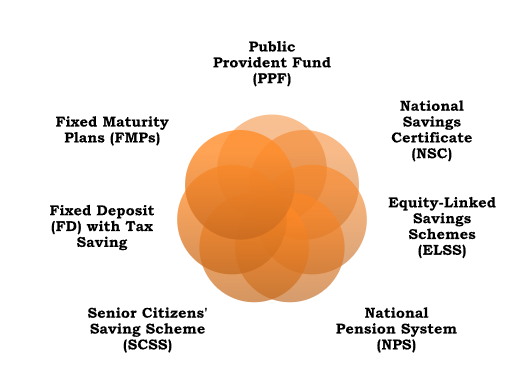
Making smart investment decisions is a crucial financial choice and when it comes to short-term investing, it's important to think about options that not only offer possible profits but also give tax advantages. In India, multiple investment paths satisfy these criteria letting investors fine-tune their economic ambitions while decreasing their tax debts. In this article, we will look into 7 Best Short Term Investment Plans with Tax Benefits in India.
Before we move on to discuss these plans, let’s understand about Short Term Investment Plans.
Table of Content
Understanding Short-Term Investment Plans
Short-term investment plans refer to financial instruments and strategies that are designed to produce returns over a relatively brief period, usually within one to three years. These plans are well-known by their focus on preserving capital while generating modest gains in a short time frame. They cater to individuals with specific financial objectives such as emergency fund creation, capital preservation, or taking advantage of immediate investment opportunities.
Types of Short-Term Investment Plans in India
The following are some of the Short-Term Investment Plans in India:
- Fixed Deposits (FDs): Fixed deposits have emerged as a top pick for shorter investment periods in India. They encompass the act of putting down a fixed amount of cash in either a bank or financial institution for an agreed-upon duration with an unchanged interest rate. By assuring returns and protecting capital, FDs are seen as a desired route for those who shy away from risks when it comes to making investments.
- Savings Accounts: While not offering the highest returns, savings accounts are highly liquid and provide easy access to funds. Many individuals use savings accounts for short-term goals and emergency funds.
- Recurring Deposits (RDs): RDs are similar to fixed deposits but allow investors to deposit a fixed sum of money at regular intervals. They are suitable for individuals who want to save small amounts systematically over a short period.
- Money Market Instruments: Instruments like Treasury Bills, Commercial Papers, and Certificates of Deposits are traded in the money market and are considered low-risk, short-term investment options, primarily utilized by institutional investors.
- Liquid Mutual Funds: These funds invest in highly liquid instruments like government securities, short-term corporate debt, and money market instruments. They offer better returns than traditional savings accounts or FDs and allow investors to access their funds quickly.
- Short-Term Debt Funds: These funds invest in bonds and debt securities with relatively short maturities. They offer slightly higher returns compared to liquid funds but come with slightly more risk.
- Corporate Fixed Deposits: Similar to bank FDs, these are offered by Non-Banking Financial Companies (NBFCs) and companies. They can offer higher interest rates but also come with higher risk, as they are not covered by the same deposit insurance as bank FDs.
A List of Best Short-Term Investment Plans with Tax Benefits
The following are some Best Short Term Investment Plans with Tax Benefits:

- Public Provident Fund (PPF): In India, the Public Provident Fund is widely regarded as a highly favored investment choice. It provides a blend of security, guaranteed returns, and advantageous tax benefits. PPF accounts obligate investors to a 15-year commitment, positioning it as a medium-term investment. Notably, the interest earned and the amount received at maturity is both exempt from taxes, making it an appealing option for cautious investors seeking tax-saving schemes.
- National Savings Certificate (NSC): The National Savings Certificate is a fixed-income investment scheme offered by the Indian government. NSC has a maturity period of 5 or 10 years. The interest on NSC is eligible for tax deduction under Section 80C of the Income Tax Act, 1961.
- Equity-Linked Savings Schemes (ELSS): ELSS is a tax-saving mutual fund scheme that invests primarily in equities. ELSS has a lock-in period of 3 years, which is relatively short compared to other tax-saving investments. Investors can benefit from potential capital appreciation along with the tax benefit under Section 80C under the Income Tax Act, 1961. However, it's important to note that ELSS investments are subject to market risks.
- National Pension System (NPS): While NPS is often considered a retirement-focused investment, it also offers tax benefits under Section 80CCD (1B) for contributions up to ₹50,000 over and above the Section 80C limit. NPS investments offer a mix of equity and debt exposure, allowing investors to potentially earn higher returns.
- Senior Citizens' Saving Scheme (SCSS): While primarily aimed at senior citizens, anyone above the age of 60 can invest in the SCSS. It offers regular interest payments and has a maturity period of 5 years, which can be extended once for an additional 3 years. The interest earned is taxable, but the investment is eligible for tax benefits under Section 80C.
- Fixed Deposit (FD) with Tax Saving: Fixed deposits are a traditional investment option that offers stability and guaranteed returns. Several banks and financial institutions offer tax-saving fixed deposits with a lock-in period of five years. Investments in these FDs qualify for tax benefits under Section 80C, up to the prescribed limit. While the returns might be lower compared to other market-linked investments, they offer a fixed and predictable income.
- Fixed Maturity Plans (FMPs): Fixed Maturity Plans (FMPs) are debt mutual funds with a fixed tenure that matches an investor's short-term investment horizon. They offer indexation benefits, reducing the tax liability on gains. FMPs can be beneficial for those seeking stable returns with tax efficiency.
Also read our Article on: Best Tax Saving Investment Plans in India
Selecting the Best Short Term Investment Plan in India
Selecting the best short-term investment plan in India requires careful consideration. The following are some of the considerations to be kept in mind while selecting short-term investment:
- Define Your Goals: Determine your financial objectives and the time horizon for your investment. Short-term investments are investments for up to three years.
- Risk Tolerance: You should assess your risk tolerance before choosing an investment plan.
- Liquidity: You should opt for investments that offer high liquidity because this ensures that you can have access to your funds in case of Immediate or unexpected expenses.
- Diversification: Consider diversifying your short-term investment portfolio. A mix of instruments like fixed deposits, liquid funds, short-term bonds, and treasury bills can balance risk and returns.
- Interest Rates and Returns: Compare interest rates or returns offered by different investment options. Look for investments that offer competitive returns while keeping risk in check.
- Tax Implications: Evaluate the tax implications of your chosen investment. Some investments may offer tax benefits or exemptions on gains.
The Bottom Line
It is important to choose the best short-term investment plan which have maximum tax benefits, as this requires an understanding of various factors such as risk tolerance, and tax planning. Individuals should also keep certain things in mind while all the above options provide tax benefits; they have high levels of risk and can provide potential returns.
You can connect with our Tax Experts at Legal Window before you choose to make any investment decision.
Company Secretary and diligent learner deeply immersed in the world of corporate law, compliance, and governance with a focus on developing a robust foundation in legal principles and corporate practices. Passionate about exploring the intricacies of company law, regulatory compliance, and corporate governance.
Categories
- Agreement Drafting (23)
- Annual Compliance (13)
- Change in Business (37)
- Company Law (150)
- Compliance (90)
- Digital Banking (3)
- Drug License (4)
- FEMA (17)
- Finance Company (42)
- Foreign Taxation (9)
- FSSAI License/Registration (15)
- GST (124)
- Hallmark Registration (1)
- Income Tax (214)
- Latest News (36)
- Miscellaneous (170)
- NBFC Registration (8)
- NGO (18)
- SEBI Registration (6)
- Section 8 Company (10)
- Start and manage a business (27)
- Startup/ Registration (134)
- Trademark Registration/IPR (48)
Recent Posts
- Major Upgrade: Breaking Down GST 2.0 September 15, 2025
- New Income Tax Bill 2025 August 27, 2025
- ITR-3 Form Explained: Who Should File & Step-by-Step E-Filing Guide (FY 2024-25) June 25, 2025
All Website Tags
About us
LegalWindow.in is a professional technology driven platform of multidisciplined experts like CA/CS/Lawyers spanning with an aim to provide concrete solution to individuals, start-ups and other business organisation by maximising their growth at an affordable cost.








